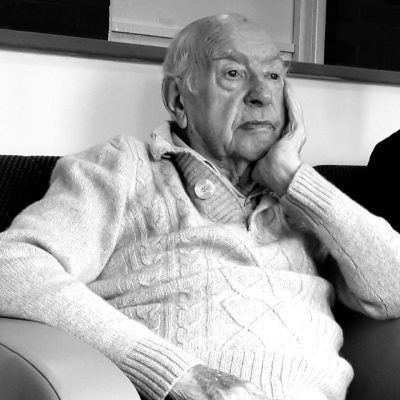
For more than 50 years John Turner has been a towering figure in Labour politics in Bridgwater.He has a street named after him, a room in the Town Hall named after him, he’s a ‘Freeman of the Town’, a former Mayor, a former Borough Councillor, Sedgemoor District Councillor and still a Town Councillor, an ex-Trades Union leader, an ex-Magistrate and , probably most important to him, an ex-Matelot.
John Turner was first elected to Bridgwater Borough Council in 1961, continued onto its successor councils Sedgemoor District (1974) and Bridgwater Town (2003). Throughout this time he never lost an election and for most of it he was the Leader.
Never Lost an Election
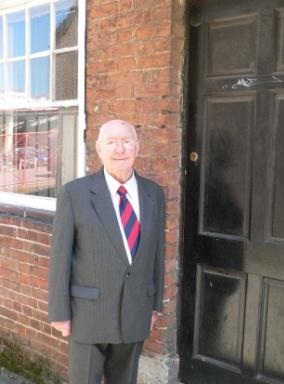
In fact the only election he ever lost was when he stood for Parliament in 1987. But despite constantly inviting everyone for tea and scones in the HoP café, he probably didn’t expect to win.
To the people of Bridgwater who re-elected him time and time again he was ‘the Labour man’. “Go see the Labour man” “Go ask the Labour man, he’ll help you out” John recalled long after the event people approaching him and saying “You got my mum a council house in 1961, can you help me now?”. Throughout all this he never moved from his Gloucester Road council house until very recently when ill health and infirmity now finds him in a Rhode Lane care home.
Bridgwater Born and Bred
John Turner was born in the middle of Bridgwater, a town he never left apart from a sail round the world with the Royal Navy, on May 18th 1928. The house can still be seen if you walk down the passage alongside the Mansion House and the Town Hall. It was the year Johns father Bill came home from his own Navy career which had included taking part in the Battle of Jutland in the first world war. When he was home his dad worked for George Randall’s timber merchant by the docks and then for the Borough council. The family was also very close to the Goodman family. George worked as a volunteer firefighter pushing around a bread cart full of hoses whenever there was a fire and brother Harry Goodman was a Labour councillor and the same year was the first signatory on the books of the newly opened Unity House. The Borough got its first fire engine in 1936 and Bill Turner was its first driver. John grew up surrounded by people who knew the value of public service, trades unionism and the Labour Party.
In 1937 Bill Turner had a cerebral haemorrhage and died. 11 people lived in their house at any one time. John remembers they all had to wash in a tin bath in front of the fire “It was like a sheep dip!”. In 1939 John’s mum married George Goodman and added a further 3 kids….sometimes when you wonder why Bridgwater’s such a strong labour town you only have to look at the massive families that our founding fathers in the 20s and 30’s had and it doesn’t seem so odd after all….
John went to Westover school but the younger kids went to Eastover as the family moved to Barclay street. The Second World War had broken out in 1939 and John left school at 14 and entered the world of work as a delivery boy for World Stores in Eastover and then on to HW Glovers in St John street where they started to do war work including turning out flanges for tank wheels. But as soon as he could he joined the Navy. There was never really going to be any other option.
Active Service
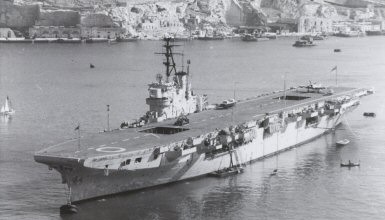
Signing up in Bristol he went off to HMS Glendower in North Wales for his 8 weeks training and pretty soon was off on a troop ship out of Liverpool heading for Malta. By now however, it was 1946 and the war was over – but the Royal Navy still had trouble spots around the world to deal with. John’s ship was the aircraft carrier HMS Ocean and he was an air mechanic O-ordinance, dealing with repairs to bombs and gun racks. John’s time in the navy was all about ‘showing the flag’ whether it was Venice, Trieste, Rhodes or St Tropez it was all part of the job. But his hardest posting was to Palestine where the British forces were engaged in the impossible task of trying to maintain the Crown mandate in the face of the newly forming state of Israel. A task which meant intercepting Jewish refugees from war torn Europe and preventing them arriving illegally. An impossible task because the British Government had accepted that there would be a state of Israel…’but not yet’ and so the role of the Brits was to round them up and fill up the camps of Cyprus while the activities of the Israeli nationalists, particularly terror groups such as the Stern Gang, was to drive the British out of the new homeland they would eventually create. The Brits pulled out. John’s ship took the rearguard -the Coldstreams -away with them and the state of Israel was born.
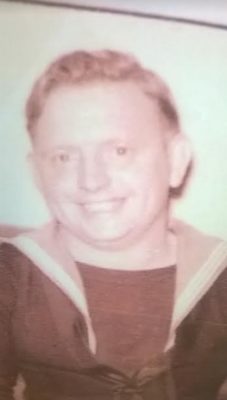
Johns life changed as he got married, qualified to be an acting Petty Officer, and moved to cover Home waters where he was largely involved in Jet trials in the Irish sea. But the world was also changing and a new confrontation of ideologies set loose a new Cold War. NATO was formed to defend the Capitalist West against the Communist East and John was sent off to the Arctic Circle on NATO exercises while across the world a bloody hot war broke out in Korea. But by 1953 John had done his 7 years and came out and moved back to Bridgwater.
Bridgwater in the 1950’s
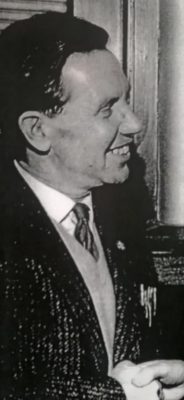
The Bridgwater John returned to in the mid 50’s was a battlefield for Labour. A strong working class and trade union town with large workplace industries, the Party had got itself organised through the organisational skills of Czechoslovakian socialist refugee Fred Phillips and had taken control of the Borough council which it intended to hold onto and bring about some major changes for the people of the town.
John’s political views had already been formed with the strong influence of his father-who collected the Trade Union subs in the council yard . Across the road from him John knew the fiery communist Bud Fisher who was a dynamic and revolutionary figure back in the 30s , organising protest marches, leading the Unemployed Workers movement and even flying Red Flags from his Clare Street house on Jubilee day 1935 in defiance of angry mobs. However, John’s views were always ‘pragmatic’ and were shaped by the corporatist Labour and Trades Union politicians around him – Harry Goodman, for instance, who ploughed a mainstream furrow of Party and Union organisation first, gaining power and not starting campaigns you couldn’t win or making promises you couldn’t keep.
In 1953 John returned to Bridgwater and started work at British Cellophane. He had trained as an armourer and had dealt with explosives so people were steering him towards the ROF. Both workplaces had 3 shifts but ROF out at Puriton would have involved too much travelling.
1950’s Bridgwater was awash with council houses. The newly victorious Labour Government of the 1940s had boosted slum clearance and introduced council housing on a massive scale – something which John was always passionate about -and his first Council House was in Bincombe road on the Sydenham estate where he started a family, Susan, Linda, Julie and John.
Into the Labour Movement
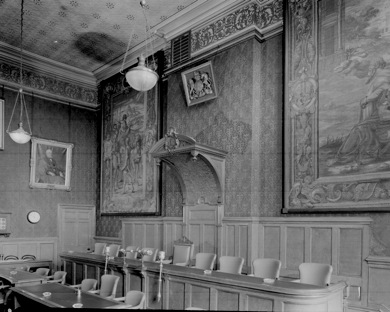
John worked as a process worker in the castings department of BCL where it was “hot, dirty, sweaty and stinking” but in 1953 £7.50 a week for 3 shifts wasn’t bad. During this time he naturally veered towards the Trade Union. His dads old union the T&GWU and quickly became a shop steward helping to build up the union to 100% representation. John eventually became the Branch Secretary and went on Union sponsored courses and conferences.
It was at the same time that he joined the Labour Party. While living at Bincombe road he was visited by Fred Phillips collecting subs. In 1954 he joined the Party and by 1955 he was a T&GWU delegate to the GMC.
The Council ‘Disease’
By 1960 he “had his arm twisted” to become a Labour councillor and won his first election in 1961 representing Sydenham. Labour controlled the Borough with 19 out of 24 councillors and John admits as soon as he got his feet under the table “it became like a disease” and he stuck with it. Very quickly he became Chair of the CLP.
At this time the Bridgwater Labour Party was large, strong and meetings well attended. John recalls that a Quorum was set as high as 25 and 40 to 50 people would attend. Labour ran the Borough and came close to the Tories in every Parliamentary election. The Party had a natural left-right divide with the AEU members, such as Charlie Milne,Les Porter and Joe Ayres,being largely on the right and the T&GWU members on the left with John Turner, Tom Searle and Ken Richards coming from a background of industry and supported by the strongly socialist Fred Phillips and council group Leader George Poskitt alongside the Christian Socialist Bobbie and Charlie Tester and the peace activist Andy Kier. John was part of the ‘anti bomb’ group although he never went on any of the Aldermaston marches that other members of the local party did.
At the same time the Borough council opened the new Lido swimming pool and Princess Alexandra came down to do the honours. John remembers that “while many of the Labour group queued up to shake her hand, I stayed away and quite frankly I’ve never attended any of the Royal things. There’s always been that feeling in Bridgwater -Admiral Blake, Cromwell, the Monmouth Rebellion.”
It was the Bridgwater Borough council, of which John’s brief was Planning, that in the 60’s gave the green light for the slum clearances of West street and John personally who went to Shire Hall in Taunton to push the case for the West street flats, the only tower bloc in Somerset to this day.
At one point the Labour Group on the Borough was a single vote away from a major Clay Cross style rebellion against implementing the Heath Government’s rent rebate scheme and on another occasion defying Maggie Thatcher and her milk snatching demands.
John also remembers the Borough council bringing in a 5 day week for council staff in the face of bitter opposition from the group of ‘Independents’ – “These were people like Margaret Rees, who started as a Liberal then became ‘independent’ -but they were all really Tories. This was obvious to us at the time, and opposition now looks idiotic, but that was what they were like ‘opposition for its own sake, anything that cost money-oppose it all!”
World turned upside down
In 1974 things were turned upside down for the Red Borough of Bridgwater when the Government review abolished it and replaced it with Sedgemoor District Council ending 500 years of Bridgwater controlling its own destiny. Borough councils were more often than not Labour run and Rural District councils Tory. The power of the Towns was to be marginalised by submerging them in Tory districts.
Some councillors like Fred Phillips and George Poskitt, stood down and refused to serve as a minority on Sedgemoor. Fred finally even stood down as agent and secretary in 1977. John Turner chose to continue and soon became leader of the Labour group.
From 1974 onwards Bridgwater Labour Party remained strong in the town but the power and influence of the councillors declined as out of town Tories ran the show. Soon the only positions within the community Labour councillors could aspire for was the ceremonial post of Mayor of Bridgwater, a position chosen by the elected members of the District within the Town under the guise of the ‘Charter Trustees’.
Labour re-opens old wounds
By the 1980s the left-right divisions in the party rose to the surface in a very public way when 6 right wing councillors refused to recognise the selection of left wing councillor Bob Brookes due to his campaigning against Hinkley Point and stood against the Party as ‘Traditional Labour’. In 1987 it was not just council election year but general election year and John Turner had been selected as Labour’s Parliamentary Candidate and as Sedgemoor Labour Group leader he was under a lot of pressure to deal with the crisis. He made the right call -and there was never any question. The principal of party loyalty and doing things by the book saw him fighting against former colleagues in the election and winning. The rule book said that Labour members chose their candidates not other councillors and that was the principal John stood on.
The 1987 election however was a disaster for Labour. It was the height of Thatcherism and the Tories won their 3rd election in a row, Labour floundered at 3rd place in Bridgwater and on the council the battle with ‘Traditional Labour’ devastated both sides with only 5 councillors remaining from Official Labour (plus the sole Trad Lab-Joe Ayres who now permanently sided with the Tories anyway).
Labour was at its lowest ebb when in 1989 Thatcher thought she could finally crush the working class by introducing her totally unfair and punitive ‘Poll Tax’. John, as a Magistrate, refused to serve on Poll Tax cases but stopped short of backing the ‘don’t pay’ campaign which many party members were supporting. But the Poll Tax battle brought down Thatcher and revived the fortunes of Labour locally and in 1991 they were back up to full strength on the Council.
In 1993 John broke the habit of a lifetime and agreed to become the Town Mayor and during his time even visited Bridgwater’s new Czech twin town Uherske Hradiste and appeared on Czech TV.
Labour back in power
By 1995 the Tories had collapsed Nationally and even Locally. Labour and Liberals combined to wrest control of the Council from them -but it was precarious. 13 Labour and 12 Libdems against 24 Tories and independents was a delicate victory. Labour’s Sandy Buchanan became the Chairman and the Liberal leader Heather Strawbridge became council Leader. John happily accepted the post of chairman of the Housing committee while Labour and Liberals shared the Chairs and Vice Chairs of all committees, running the council by a delicate system of ‘casting votes’. John maintained a strict party discipline to ensure Labour members attended and voted consistently. Sadly, the Lib Dems hardly ever voted the same way twice and the Tories were often able to divide and rule.
In 1999 the Tories regained total control as the Liberals slumped from 12 to 2 seats at the elections. They were firmly back in control and by 2003 were once more a one party state with some 35 members.
Re-establishing the ‘Red Borough’
In 2003 John had fixed his eyes back on re-establishing a Town Council for Bridgwater and although he continued as a Sedgemoor councillor he stood down as leader in 2003 handing over to Roger Lavers, his new focus was Town. In 2003 after petitioning the Labour Government a new Town Council for Bridgwater was created. As leader of the Labour group on Town Council, John became its first Leader, picking up from where he’d left off on the Borough.
In 2012 John stood down as a Sedgemoor District Councillor but continued as a Town Councillor and that same year was made Honorary Freeman of the Borough. A historical honour rarely used in recent times but his name now adorns the rolls of honour on the walls of the Charter Hall. One of the historic rights is apparently to ‘drive his sheep through the town’.
Thus far he hasn’t tried it.

In reading the splendid account of John’s life and activities, I feel glad to be able to report as follows:
In recognition of John Turner’s contribution to voluntary service in Bridgwater, and during my second presidency of the Rotary Club of Bridgwater, he was awarded a PAUL HARRIS Fellowship., such being the highest award in recognition of local, national and International services, on behalf of the world-wide Rotary International.
Although seemingly suspicious of such perhaps having a party political gesture, John recognised the Independance and importance thereof, and I have been delighted to see his badge of Fellowship being worn with pride by him on certain occasions. He is indeed a much respected member of our local society.
Met John when I moved to the area and joined Bridgwater Labour Party in the early 90s. Amazing lifelong dedication to helping people and to the basic principles of the Labour movement as well as a very nice man. If we only had a lot more like him in politics today we would be better served. Moved area now but wish John best wishes.
A really interesting account of John, who commands a lot of respect within our local Labour movement. I love the bit about quorum being set as high as 25 and 40-50 members regularly attending meetings. After the General Election this year, we weren’t far off that! Numbers have gone down back to 15-20. It would be so good if we can get back up to those sorts of numbers again!